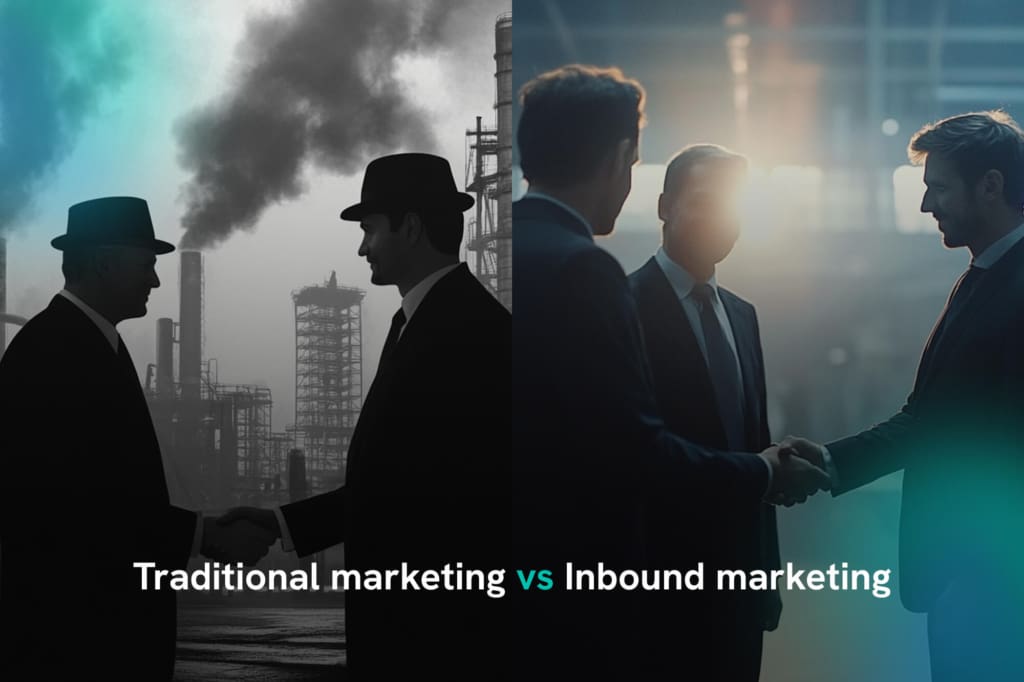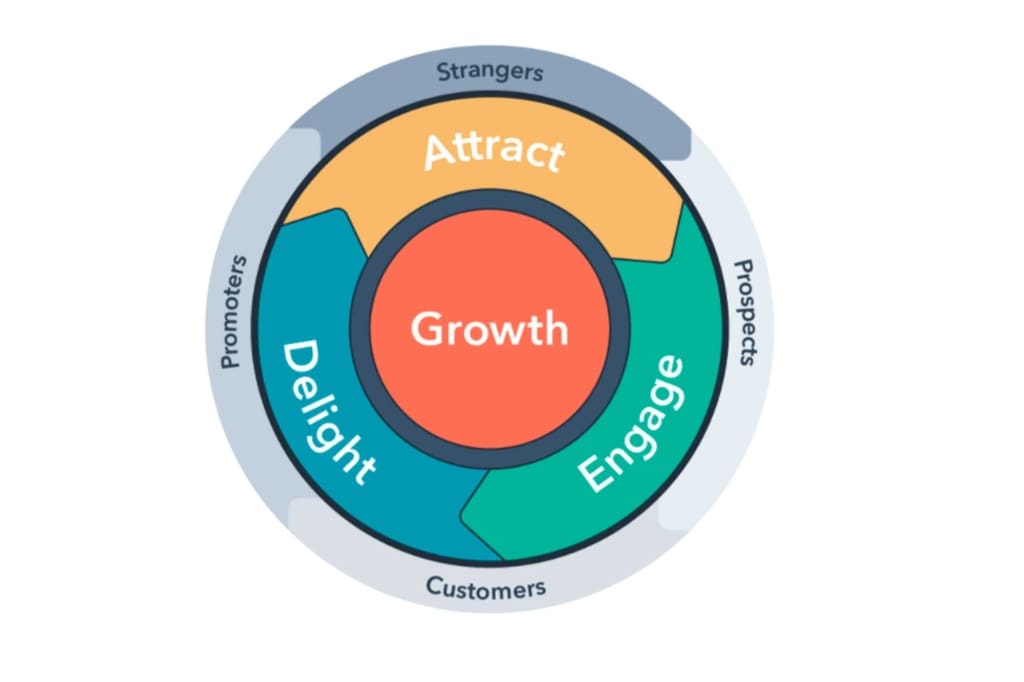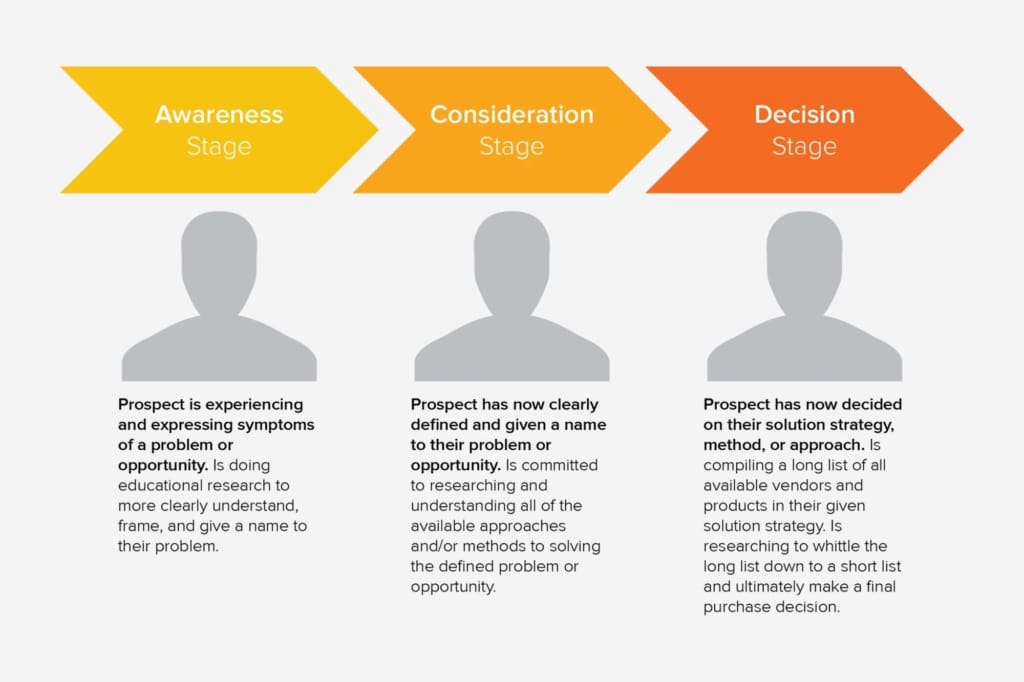Attract customers to your manufacturing business with B2B inbound marketing
Before we delve into the subject of B2B inbound marketing and what your chosen partner agency should be delivering, I want to walk you through some of the core principles of inbound marketing, why it’s crucial for manufacturers, and how it can be used to increase sales conversations. We’ll also delve into the principles of B2B inbound marketing, explain the marketing funnel stages, discuss popular marketing platforms, and highlight the services and capabilities a manufacturer should expect from a top-tier B2B inbound marketing agency.
Over the last few years we have started to see a shift with manufacturers adopting this type of strategy, and they are now reaping the rewards. Traditional marketing methods, such as cold calling and trade shows, are becoming less effective, and manufacturers are increasingly turning to digital strategies to reach their target audience.
One of the most effective strategies is B2B inbound marketing, which focuses on attracting, engaging, and delighting customers through valuable content and personalised experiences.

Understanding B2B inbound marketing
What is B2B inbound marketing?
B2B inbound marketing is a strategy that attracts potential customers to your business through content creation and engagement tactics that align with their needs and interests. Unlike outbound marketing, which involves pushing your message out to a broad audience through ads and cold outreach, inbound marketing draws customers in by providing solutions to the problems they are already looking to solve.
Importance for manufacturers
For manufacturers, B2B inbound marketing is particularly powerful because it allows you to build relationships with prospects over time. In industries where sales cycles are longer and products are more complex, educating potential customers and guiding them through their decision-making process is crucial. Inbound marketing does this by offering valuable content that addresses specific pain points at each stage of the buyer’s journey, ultimately leading to higher-quality leads and more meaningful sales conversations.
The inbound marketing methodology
The inbound marketing methodology is built on three core phases: Attract, Engage, and Delight. Each phase plays a critical role in converting strangers into customers and customers into promoters of your business.

Attract: Drawing in the right audience
The first step in inbound marketing is to attract the right people to your website and other online platforms. This is done by creating and sharing relevant content that speaks to the challenges and needs of your target audience. Key strategies include:
- Search engine optimisation (SEO): Optimising your website and content for search engines so that potential customers can easily find you when searching for solutions related to your products.
- Content marketing: Creating blog posts, whitepapers, videos, and other forms of content that provide valuable information to your audience.
- Social media marketing: Using platforms like LinkedIn, Twitter, and industry-specific networks to share your content and engage with your audience.
Engage: Building relationships and trust
Once you’ve attracted visitors to your site, the next step is to engage them by offering solutions to their problems. This phase is about building relationships and establishing trust. Strategies include:
- Personalised content: Providing content that is tailored to the visitor’s stage in the buyer’s journey and their specific needs.
- Email marketing: Nurturing leads with targeted email campaigns that deliver relevant content and offers based on their behavior and interests.
- Landing pages: Creating landing pages that encourage visitors to take specific actions, such as downloading a guide, signing up for a webinar, or requesting a consultation.
Delight: Ensuring ongoing satisfaction
The final phase of inbound marketing is to delight your customers by providing ongoing support and valuable content that helps them succeed. This not only encourages repeat business but also turns customers into promoters who advocate for your brand. Tactics include:
- Customer service portals: Offering self-service resources like FAQs, how-to guides, and troubleshooting tips.
- Feedback and surveys: Gathering feedback from customers to continuously improve your products and services.
- Loyalty programs: Implementing programs that reward repeat customers and encourage referrals.
The marketing funnel explained
Understanding the marketing funnel is essential for effectively guiding potential customers from the first interaction with your brand to becoming a paying customer. The funnel is typically divided into three stages: Awareness, Consideration, and Decision.

Awareness stage: Building brand visibility
In the Awareness stage, potential customers are just starting to recognise that they have a problem or need. Your goal here is to capture their attention and introduce them to your brand as a potential solution. Effective strategies include:
- Blog posts: Writing educational content that addresses common pain points and industry challenges.
- Infographics: Creating visually engaging content that simplifies complex concepts or data.
- Social media content: Sharing relevant industry news, tips, and insights to engage your audience on social platforms.
Consideration stage: Nurturing interest
During the Consideration stage, the buyer has clearly defined their problem and is researching possible solutions. Your content should now focus on demonstrating how your products or services can solve their specific issues. Strategies include:
- Webinars: Hosting webinars that provide in-depth information and showcase your expertise.
- Case Studies: Sharing success stories that highlight how your solutions have helped other companies in similar situations.
- Comparison Guides: Creating guides that compare your offerings to competitors, highlighting your unique value proposition.
Decision stage: Converting leads into customers
In the Decision stage, the buyer is ready to choose a solution. This is where you need to make a compelling case for why they should choose your company. Strategies include:
- Product Demos: Offering live or recorded demonstrations of your products in action.
- Free Trials: Providing a limited-time trial of your product to give potential customers a hands-on experience.
- Consultations: Offering personalised consultations to discuss the buyer’s specific needs and how your solution can meet them.
Generating and qualifying leads
The primary goal of B2B inbound marketing is to generate high-quality leads and nurture them into sales-qualified leads (SQLs). Here’s how to effectively manage this process.
Sales qualified leads (SQLs): What they are and why they matter
An SQL is a lead that has been vetted by both the marketing and sales teams and is deemed ready for direct sales follow-up. SQLs are more likely to convert into paying customers because they have shown clear intent and interest in your offerings.
Lead scoring and segmentation
Lead scoring involves assigning a numerical value to leads based on their interactions with your content and their fit with your target customer profile. For example, a lead who has downloaded multiple whitepapers and attended a webinar might score higher than one who has only visited your website once.
Segmentation involves dividing your leads into groups based on specific criteria, such as industry, company size, or behaviour. This allows you to tailor your marketing efforts to the unique needs of each segment, increasing the likelihood of conversion.
Nurturing campaigns
Nurturing campaigns are designed to move leads through the funnel by providing them with relevant content and offers at each stage. For example, a lead in the Awareness stage might receive educational blog posts and eBooks, while a lead in the Decision stage might receive a demo offer or consultation request.
Popular marketing platforms for implementing B2B inbound marketing
Choosing the right marketing platform is critical for executing and managing a successful inbound marketing strategy. Here are some of the most popular platforms used by B2B inbound marketing agencies.
HubSpot
Overview: HubSpot is one of the most comprehensive inbound marketing platforms available, offering tools for content creation, SEO, social media, email marketing, and CRM.
Why it’s great for manufacturers: HubSpot’s all-in-one approach allows manufacturers to manage every aspect of their inbound marketing strategy from a single platform. Its robust analytics features also help measure the effectiveness of campaigns and make data-driven decisions.
Salesforce pardot
Overview: Pardot is a B2B marketing automation platform by Salesforce that focuses on lead generation, nurturing, and management.
Why it’s great for manufacturers: Pardot integrates seamlessly with Salesforce CRM, making it an ideal choice for manufacturers who need to align their marketing and sales efforts closely. Its lead scoring and grading features help prioritise the most promising leads.
Marketo
Overview: Marketo is another powerful marketing automation platform that offers advanced features for lead management, email marketing, and analytics.
Why it’s great for manufacturers: Marketo’s flexibility and scalability make it suitable for large manufacturers with complex marketing needs. Its predictive analytics and account-based marketing (ABM) capabilities are particularly useful for targeting high-value accounts.
Comparison of platforms
While each platform has its strengths, the choice ultimately depends on your company’s specific needs. HubSpot is ideal for those looking for an all-in-one solution, Pardot is best for Salesforce users who need tight integration with their CRM, and Marketo is suited for larger enterprises with more complex marketing requirements.
What to expect from a B2B inbound marketing agency
When selecting a B2B inbound marketing agency, especially as a manufacturer, it’s crucial to ensure they offer a comprehensive range of services and possess the expertise needed to drive results. Here’s what you should expect.
Comprehensive services
A reputable B2B inbound marketing agency should offer a wide array of services, including:
- Strategy development: Creating a customised inbound marketing plan that aligns with your business goals and targets the right audience.
- Content creation: Developing high-quality content that resonates with your audience and drives engagement.
- SEO and SEM: Optimising your website and content to improve visibility in search engines and drive organic traffic.
- Social media management: Managing your social media presence to build brand awareness and engage with your audience.
- Email marketing: Crafting and executing email campaigns that nurture leads and drive conversions.
- Analytics and reporting: Providing regular reports that track the performance of your campaigns and offer insights for improvement.
Expertise in manufacturing
Manufacturing is a unique industry with specific challenges and opportunities. A top-tier B2B inbound marketing agency should have a deep understanding of the manufacturing sector and experience working with manufacturers. This expertise ensures they can create strategies and content that resonate with your target audience and address their unique needs.
Tools and technologies
A good agency should be proficient in using the latest tools and technologies to enhance their marketing efforts. This includes marketing automation platforms like HubSpot, Pardot, and Marketo, as well as analytics tools, CRM systems, and content management systems (CMS). They should also be able to integrate these tools seamlessly into your existing processes.
Case studies and proven results
Before choosing an agency, ask to see case studies or examples of their work with other manufacturers. This will give you an idea of their capabilities and the results they’ve been able to achieve for similar businesses. Look for case studies that demonstrate their ability to generate leads, improve conversion rates, and drive revenue growth.
Frequently asked questions (FAQs)
What is the difference between inbound and outbound marketing?
Inbound marketing focuses on attracting customers through content and engagement, while outbound marketing involves pushing your message out to a broad audience through ads, cold outreach, and other interruptive methods. Inbound marketing is generally more cost-effective and better suited for today’s digitally-savvy buyers.
How long does it take to see results from inbound marketing?
Inbound marketing is a long-term strategy that typically takes 6-12 months to start showing significant results. However, you may begin to see improvements in traffic and lead generation within the first few months, depending on the tactics used and the existing state of your online presence.
How can a B2B inbound marketing agency help my manufacturing business?
A B2B inbound marketing agency can help your manufacturing business by creating and executing a tailored inbound marketing strategy that attracts high-quality leads, nurtures them through the buyer’s journey, and converts them into customers. They can also help you optimise your online presence, create engaging content, and measure the effectiveness of your marketing efforts.
What should I look for in a B2B inbound marketing agency?
When choosing a B2B inbound manufacturing marketing agency, look for one with experience in the manufacturing sector, a comprehensive range of services, proficiency in the latest marketing tools and technologies, and a proven track record of delivering results. It’s also important to choose an agency that aligns with your company’s values and culture.
How do I measure the success of my inbound marketing campaigns?
The success of inbound marketing campaigns can be measured through various metrics, including website traffic, lead generation, conversion rates, customer acquisition cost (CAC), and return on investment (ROI). A good agency will provide regular reports and insights to help you track these metrics and optimise your campaigns for better results.
In summary
Without doubt, manufacturers need more than just traditional marketing methods to succeed and the industry is slowly understanding this. B2B inbound marketing for manufacturers offers a powerful way to attract, engage, and convert potential customers by providing valuable content and personalised experiences. By choosing the right B2B inbound marketing agency, manufacturers can leverage this strategy to drive growth, improve sales conversations, and achieve their business goals.
Whether you’re just starting with inbound marketing or looking to optimise your existing efforts, working with a knowledgeable and experienced agency can make all the difference. From strategy development to execution and analysis, the right agency will provide the support and expertise you need to succeed in today’s digital world.
If you’re ready to take your manufacturing business to the next level with B2B inbound marketing, contact a specialised agency today to discuss your needs and start crafting a strategy that drives results.

